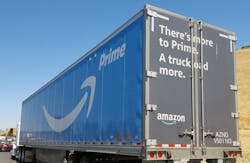Amazon Prime Day coincided with the deadline for this month’s magazine, so I thought this would be an appropriate opportunity to review what Amazon and the rapid e-commerce ramp up mean for trailer manufacturers, body builders, upfitters, dealers and distributors.
The shorthand version: If you sell to Amazon, or an Amazon transportation partner, that’s probably good. If Amazon sells what you sell, that’s probably not so good (and we’ll discuss that further in October’s aftermarket issue).
For equipment manufacturers, it’s really about how Amazon affects the fleet customers who haul freight. For them, the e-retail giant is both a shipper and a competitor. As the former, Amazon is an opportunity—if a fleet can meet Amazon’s demanding standards, and still make a profit.
And Amazon demands perfect, transparent service—that means reliable, efficient equipment, with all of the latest telematics systems for routing and load tracking. In the long-haul space, fleets will expect trailers to be equipped to meet these requirements, but that transition is already well underway. Manufacturers will need to put some thought into designing the most flexible smart-trailer solutions, but the technology is available—there’s no need to reinvent the wheel. (Just pick up a recent edition of Trailer-Body Builders, and take your pick of connected trailer tech.)
This is driven, of course, by the e-commerce shift to one- and two-day delivery. And the distribution channel response, increasingly, is to beef up middle- and final-mile services. In turn, trailer manufacturers and body builders are going to need to offer smaller, lighter and—again—flexible solutions, whether that’s straight trucks to replace tractor-trailers, or step vans to replace straight trucks, or small vans to replace step vans.
Several of the largest trailer manufacturers have already added to their product lineup (such as Great Dane with the acquisition of Johnson Truck Bodies, or Wabash National in buying Supreme Industries), while body builders are looking for van upfit specialists to partner with. The aim is to retain customers by offering products for the full range of their needs. But if being all things to all customers were easy, anyone could do it.
In a Q&A session with investment analysts earlier this year, Wabash President and CEO Brent Yeagy explained that the company’s product mix would indeed protect it from a shifting supply chain and the move to more regional and local delivery. And he does not anticipate a significant “cannibalization” of the highway trailer market, but rather an “expansion in the overall need for assets within the changing logistics model.”
“From a Wabash perspective, regardless of where that trend goes, effectively it’s just a swing of revenue for us,” he said. “We’re positioning product across the board to fulfill whatever need is present within the logistics models.”
But speaking of revenue swings, trailer manufacturers shouldn’t get too excited about reports that Amazon has leased and branded 10,000 trailers and launched its own freight brokerage service—because the company is now competing with existing 3PLs and carriers.
Case in point: XPO Logistics has reported it will take a $600 million revenue hit in 2019 because its largest customer—said to be Amazon—has substantially cut back its business. So if you’re selling trailers to XPO, you might not be selling as many. Similarly, FedEx recently announced it will not make ground deliveries for Amazon when the current contract expires later this month.
Clearly, Amazon must control its transportation spend (reported to be some $7 billion in Q1) and the company is doing what it must do to grow. But there is increasing concern in the carrier community that Amazon’s size, along with its ability to operate a freight brokerage with no need to turn a profit, will exacerbate the race to the bottom as far as rates are concerned—and that’s bad news for an industry notorious for its ultra-thin margins. And if truckers aren’t making money, they’re not buying a lot of new equipment.
But we’ve seen this coming. I covered a shipper conference in 2017 where an investment analyst outlined a chain of events that was remarkably prescient. He likened Amazon to “the pretty girl at the dance” that carriers couldn’t resist, and the first date goes well. But once you’re going steady, she gets very demanding and “it’s just a series of frustrations.”
The analyst also noted that as Amazon disrupts retail market after retail market, “truckload shipments to these places are going to go away.”
There’s some good news, however. As FTR’s Don Ake told us last month, he anticipates e-commerce will require more drop-and-hook operations, and that means more trailers.
There’s also a wild card in the equipment mix: Potential changes in federal trailer length restrictions. Putting bigger trailers or longer combos on the road has been a tough sell to Congress, but maybe the threat of not getting those next-day packages will overcome constituent concerns about big rigs getting too big.
For better or worse, these are interesting times.
About the Author
Kevin Jones
Editor
Kevin has served as editor-in-chief of Trailer/Body Builders magazine since 2017—just the third editor in the magazine’s 60 years. He is also editorial director for Endeavor Business Media’s Commercial Vehicle group, which includes FleetOwner, Bulk Transporter, Refrigerated Transporter, American Trucker, and Fleet Maintenance magazines and websites.
Working from Beaufort, S.C., Kevin has covered trucking and manufacturing for nearly 20 years. His writing and commentary about the trucking industry and, previously, business and government, has been recognized with numerous state, regional, and national journalism awards.

